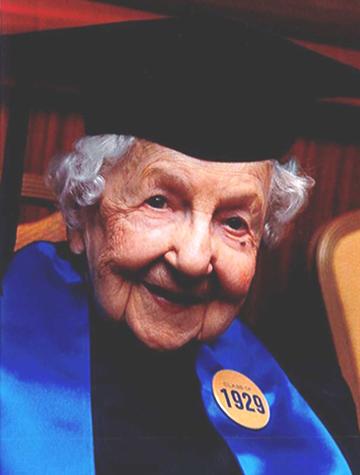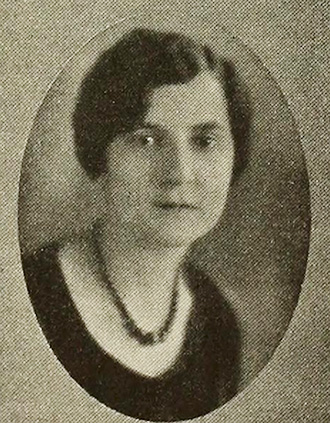Freedman's mother grew up in Waterville, Maine. "Her half-sister from her widowed mother's first marriage saved money each week from her job as a bookkeeper to assure that my mother could get a college education." Freedman recounted. "That encouragement brought my mom, the valedictorian of her high school class, to Simmons, where she was an enthusiastic and accomplished student who became a very loyal alumnae."
Like her mother, Freedman studied Library and Information Science, eventually becoming the Dean of Library Services at the University of Massachusetts Dartmouth. Having spent many years in academia, she recognizes how unique and valuable her Simmons education was. "I was taught by faculty like Lawrence Langer and Wylie Sypher who were active researchers and writers, but they also paid such conscientious attention to their students. It was just remarkable."
After working in a public library, Freedman became the Director of the Endicott College Library, and then moved to Salem State University. "I went to Salem in the heyday of political activism in the 1970s. I linked my work as a librarian to whatever was happening on campus within and beyond the classroom." For one example, Freedman and a student aide who was active in the Student Government established the Library of Social Alternatives with a small allocation from the student activities fee paid by all students. The library was shaped according to the interests and requests of students and included books, journals, and pamphlets on the many social change movements that were burgeoning at that time.
Another vital part of her work at Salem State was teaching information searching strategies. She developed a course with a professor of media studies, encouraging students to become "information sleuths," skilled in locating, evaluating, and presenting information. Students learned to fully utilize library resources and to conduct and edit interviews and incorporate audio and visual materials in presentations of their work. The course was eventually part of an integrated first year curriculum that won recognition from the American Association of State Colleges and Universities and funding from the Council of Library Resources and the National Endowment for the Humanities.
Freedman became the library director at what is now University of Massachusetts Dartmouth in 1978. UMass Dartmouth developed from the merger of the two textile colleges in Fall River and New Bedford that formed Southeastern Massachusetts University. "At that time, the institution was still building collections and services to support a university mission," she recalls. "It was a very large task and luckily I had an outstanding staff who made it possible. Their dedication made the library an important part of every student's academic experience." While serving as Dean of Library Services, as her position was retitled, Freedman also taught courses each semester in education and women's studies, and retired in 2003 as a Professor Emerita.
Reflecting on her career, Freedman appreciates how her time at Simmons was pivotal. "Through my experiences at Simmons I began to see myself as a person capable of understanding theory, being analytical, or having an opinion." She brought that confidence into her work as a librarian. "It's such a powerful profession," she says. "A library is a place to create social change and to really give people a sense of their own worth and power and ability to make choices and decisions and be in charge of their lives."

The Simmons connections in her family are now in the fourth generation. Freedman's daughter, Elizabeth Freedman Girioni '89, '96MS studied Comparative Literature and Spanish, and later returned to Simmons for her Master's in Communications. Her granddaughter Sofia Freedman Girioni '25 has begun her second year in the Nursing program at Simmons. "It's a joy to have Sofia at Simmons," says Freedman. "We meet at the MFA, take walks through the Fenway and, in the Simmons tradition, we joined her professor, Becky Thompson, for coffee and conversation in Common Grounds."
Freedman and her family have found a way to give back to Simmons and to honor her mother and her aunt who made it possible for the Jewish daughter of immigrant parents to go to college.
"My mother was turning 80 and my brother and I wanted to do something special for her." Aside from a gathering of family at a local restaurant, they had something else in mind: the establishment of the Frances Cook Saltz '29 Endowed Library Acquisition Fund, in her honor. "We surprised her with the book fund at Simmons. Library Director Artemis Kirk '75MS not only helped establish the fund, but she came to the restaurant as a surprise, with a great thank you from Simmons and a proclamation that she got from the governor honoring my mother on her birthday."
In the years that followed, family members and friends continued to contribute to the fund, and
Simmons sent her mother annual lists of what was purchased with interest from the growing principal. "That was very special to my mother, it really moved her. A person from the alumni office came to visit my mother regularly, and corresponded with her between visits. That's the kind of thing that made my mother feel such a bond to the institution that changed her life."

Her mother died in 2009 at 101 years old. In 2004, Freedman took her back to Simmons to celebrate her 75th reunion. "Two other classmates came, and when these three ladies appeared at the head of the traditional march of the reunion classes, every eye in the room had tears, especially mine! It was a special Simmons memory."
With her energetic mother as an inspiration, Freedman continues to be active. After retirement she joined the Brandeis University Women's Studies Research Center, where she continues as an affiliated scholar. Freedman is also involved in projects in her New Bedford, Massachusetts community. She is among the dozen founders of a vibrant news resource, The New Bedford Light, and active in many initiatives to support social justice, including Our Bodies, Our Lives, a newly formed coalition to advance reproductive justice and bodily autonomy.
Freedman also wants to acknowledge Simmons' role in her development as an engaged feminist. She graduated before the women's movement became a powerful social movement, but attributes her attendance at an all women's college, where her intellect was valued, and the affirmation of women's active participation in the workforce was the institutional mission, as a major factor in her feminist activism.
That is why the quote in her mother's yearbook drew a smile to her face.

Fannie Lorraine Cook
"Cookie"
"That she is a great, big girl isn't such a misrepresentation of fact in speaking of Fannie, if you refer to her ability, academically, practically and socially. But if you mean her physical aspect, then reverse it, and say that she is tiny, dainty and petite. It seems quite obvious that although she'll make a splendid librarian, there will be other things for her to do."
"Splendid librarians can be that and other things," Freedman says. "Simmons University is a setting to encourage all the possibilities of a full and meaningful life."

